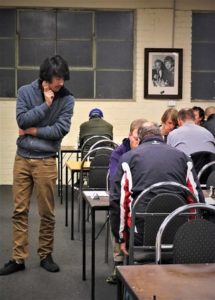Article by Chesslife Chess Coach Alex Jury
Chess is the game that simply keeps on giving. Studies have shown that a steady diet of chess increases your attentive spans, improves your memory and enhances your capacity for logical thinking. Chess truly is a workout for the brain! What, however, can it do for our social lives? If chess can improve how we think, can it play any part in how we interact with one another?
Believe it or not, but one of the many benefits of playing chess is that it enhances our sense of sportsmanship and improves the way we treat one another. This cannot be undervalued; teaching sportsmanship isn’t simply about learning proper manners, but an important life skill, especially for developing minds. Just ask physical educators Christine Nucci and Kim Young-Shim of Indianapolis, who found that a healthy and fulfilling life requires that we find ways to positively interact with the people around us. Sportsmanship, and a good social ethic, helps to guard against the destructive ‘win at all costs’ mentality – which, if left unchecked, can develop into aggressive, antisocial behaviour and habits.
It may seem odd that a game like chess could do anything to promote social development. Chess is a game that is usually played in silence, with a bare minimum of interaction between the players during play. It is, however, these very conventions and demonstrations of etiquette that build a culture of sportsmanship.

In chess, respect and integrity are as important as the pieces on the board. We shake with our opponents, before and after the game, regardless of whether the result was favourable or not. All participants, including spectators are silent so that players can concentrate on their individual games. When a game concludes, we are not boastful in victory, nor ungracious in defeat – we treat our opponents with respect at all times.

As Douglas Williams of the National-Louise University will tell you, these are formal conventions – and compliance with these conventions along with respectful communication with our opponents, before and after the game, in turn promote good sportsmanship. Even the smallest things, like helping one another set up a board or deciding who will be which side are all positive social interactions that boost our ability to socialise and build us up as social beings.

This is exactly what chess did for me. When I first started playing competition chess for my school, I was only 9 years old. I’m not too proud to admit it, but back then, I was lacking in proper etiquette. If I won – I would happily brag to anyone unfortunate enough to be nearby. As a spectator, I would make unflattering comments about other people’s games – even while they were still playing them! Worst of all, I was bitter in defeat and considered a game lost as nothing more than time wasted. At the beginning of my chess journey, I was an obnoxious player and unpleasant company.

The good news is that sportsmanship, like any other skill, can be taught, practised and mastered. I played competition chess until I was 17. The more I played, the more I became accustomed to the sensation of winning, losing and simply interacting with other people. With the help of my coaches, chess arbitrators and even my fellow players, I learned not simply how to be a good sport, but the value behind it. I came to realise that a civil game with a pleasant opponent was a far more enjoyable experience than anything I had done previously. I improved my gaming ethic and soon realised that the best part of chess was playing the game, not necessarily winning it – and that better company usually made for better games.
Chess improved me as a person. It taught me the value of sportsmanship and enhanced my ability to socially interact with other people. It taught me that there are more important things than winning and how to treat other people, even opponents, in a positive and civil manner.
If you give it a chance, with practice and patience, chess can teach you how to play a better game and become a better person.
